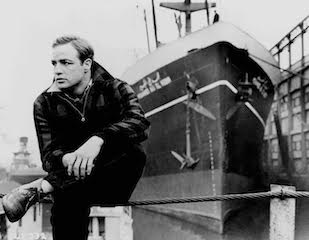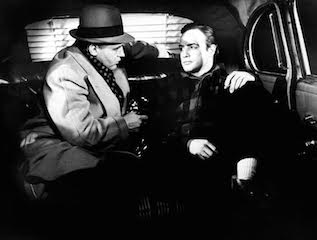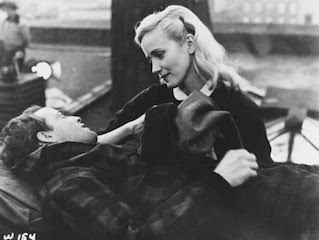On the Waterfront is one of the most influential and personally significant films I’ve ever seen, and a “contender” for my favorite classic film.
 The story follows Terry Malloy (played by the alluring, and wonderfully talented Marlon Brando) as he battles with a matter of conscience, being on the wrong or right side of the mob, who run the docks where he works. A young woman, Edie, (the lovely Eva Marie Saint) returns home from school and, shortly after her arrival, her younger brother is murdered by the very mob that controls the waterfront. This is all simply because he was going to tell the authorities and bring justice down upon them. Terry witnesses the murder and is shocked by the mob’s ruthless actions, but is too afraid to stick out his neck to say so.
The story follows Terry Malloy (played by the alluring, and wonderfully talented Marlon Brando) as he battles with a matter of conscience, being on the wrong or right side of the mob, who run the docks where he works. A young woman, Edie, (the lovely Eva Marie Saint) returns home from school and, shortly after her arrival, her younger brother is murdered by the very mob that controls the waterfront. This is all simply because he was going to tell the authorities and bring justice down upon them. Terry witnesses the murder and is shocked by the mob’s ruthless actions, but is too afraid to stick out his neck to say so.
Meeting (and falling in love with) Edie starts the transformation of bringing Terry from bum to hero. I adore their love story because it feels so real. In many older films, romance can feel shallow or contrived, but Edie and Terry’s love is different. The two characters sharpen each other because they are so drastically different. Terry has lived a very hard life. He can barely talk about his past, but he does tell her that his father was killed in an unsavory manner and that he and his older brother were then forced to live in a children’s home that he implies was an abusive nightmare. For Terry, life has always been every man for himself. As he so eloquently puts it, “Want to hear my philosophy of life? Do it to him before he does it to you.”
Edie was mostly spared from the waterfront life by the hard work of her blue-collar father who saved every penny to put her in a good school. Her education came from sisters of the church. Edie is naïve in many ways, but her eyes are wide open to corruption and deceit that got her brother killed. She makes it her mission to find out the truth of the situation. Her compassion and unyielding devotion to truth and justice rub Terry like sandpaper, but it’s not to diminish, it’s to polish. Her philosophies challenge his own at every turn. They get into a quiet debate when he takes her out for a beer, yet when she tries to leave, he begs her not to. Though she adds to the already heavy weight on his conscience, he loves her for it.
Terry: What more do you want me to do?
Edie: More. Much, much more.
The other person who plays a key role is Father Barry, the brave and unconventional priest who makes it his mission to bring down the corruption of the waterfront. He brusquely encourages Terry to man-up and break the ties to the mob in order for justice to be served. Most people think of Terry’s speech to his brother the “I could have been a contender…” speech, as the most memorable and breaking scene of the film. Although that was Marlon Brando’s moment to shine as an actor, and he did, Father Barry’s speech to the longshoremen was, in my opinion, the more poignant and convicting moment of the film. Not only for the characters but for the audience too.
Father Barry delivers his speech while standing over yet another dead workman’s body, Dugan, who almost spilled the beans on the operation just like Edie’s brother. Elia Kazan, who directed the film along with other classics like Streetcar Named Desire and East of Eden, knew how to use angles, props, and locations to symbolize what was being said in every scene. This scene is the turning point of the film, and it takes place beneath the hull of a great ship so everyone is beneath the surface so to speak. It is a great representation for being at the lowest of the low when the characters and the situation have absolutely hit rock bottom. From there the only way to go is up. When the speech is over, Father Barry is lifted up, with the body of Dugan, high above the other people. It’s a beautiful shot, but also conveys without words the fact that Father Barry and Dugan, have risen above the cowards and the criminals by choosing the higher road of truth and justice.
Father Barry: But remember, Christ is always with you – Christ is in the shape up. He’s in the hatch. He’s in the union hall. He’s kneeling right here beside Kayo Dugan and He’s saying with all of you, if you do it to the least of mine, you do it to me!
Terry has always been forced to pick up scraps, or to sacrifice his own dreams or goals for whoever is in charge at the moment. When the film begins, it’s the mob, but before that it was his brother Charlie. Terry was a prize-fighter, a real champion. However, because of Charlie and his connection to the mob, Terry was forced to lose a big fight in order for the mob to profit in a gamble. This is where Terry’s “I coulda been a contender” speech happens. Edie and Father Barry’s influence have shown Terry that he can do and be a lot more than he’s allowed himself to. Charlie threatens Terry at gunpoint to do something for the mob, but Terry calls him out, not just for this moment, but for every moment Charlie had let him down before by choosing the mob over his own brother. Terry finally realizes his worth, enough to stand up for himself in the face of corruption.
What makes Terry such a lovable and relatable character is the inner contrast of the tough-guy and the sensitive soul. Terry’s rough edges are smoothed out not only by his affections for Edie but also love and caring for the neighborhood pigeons, creatures who are otherwise despised and tossed aside. He tells Edie about the hawks in the neighborhood who prey on the pigeons one by one. It’s a pretty obvious metaphor for what’s happening with the workers on the docks and their mobster bosses. The pigeons also represent Terry’s loyalty, especially in relation to Edie. He tells her about how pigeons mate for life “they get married just like people” and his respect for that quality is a subtle way of saying he would do the same.
The Christian symbolism and themes in this film are easily recognizable, but without being preachy or imposing. All characters stay true to their makeup, and the most visible Christian character, Father Barry, is not without vices that make him down-to-earth and reachable. He has a strong temper, he tells people off, he smokes, he even *gasp* orders himself a beer. This film may have been made in the 1950s, but it was way ahead of its time in that it doesn’t shy away from showing real people as they are and delving into moral and ethical dilemmas. A lot of the films in the time period were very sing-songy about reality, but Elia Kazan had a flair for presenting the frailty of the human condition with carefully nurtured direction.
This film is actually based on the true story of a longshoreman who tried to fight his own corrupt union and failed. On the Waterfront gives that sad story a new ending, but not at the expense of authenticity. The reality is violent and dangerous, yet there is justice, redemption, and love flourishing in the cracks of this cold, gray world. Where priests and prize-fighters are more than conquerors.



